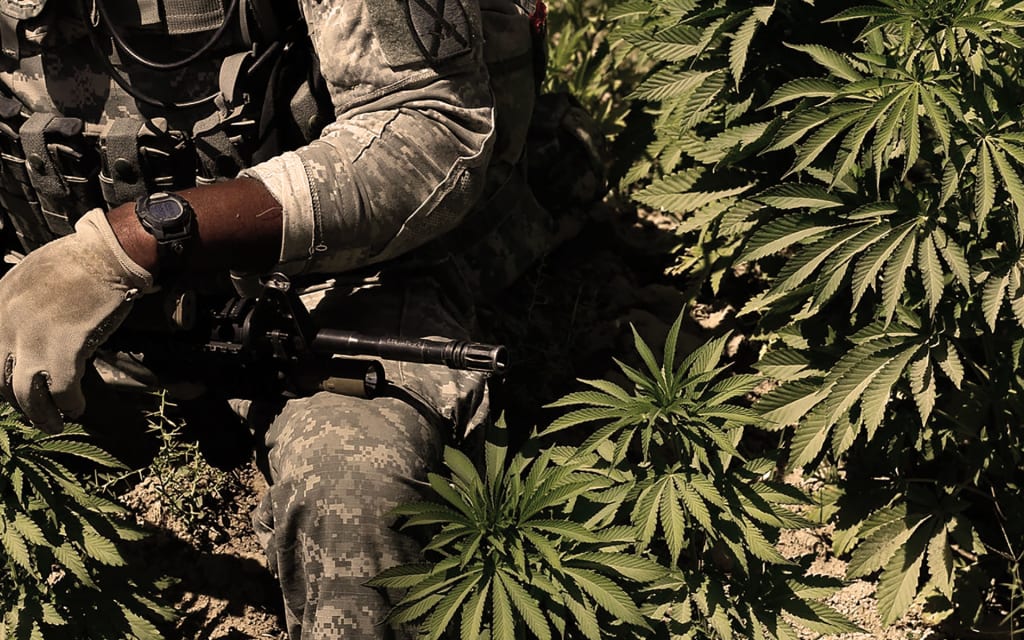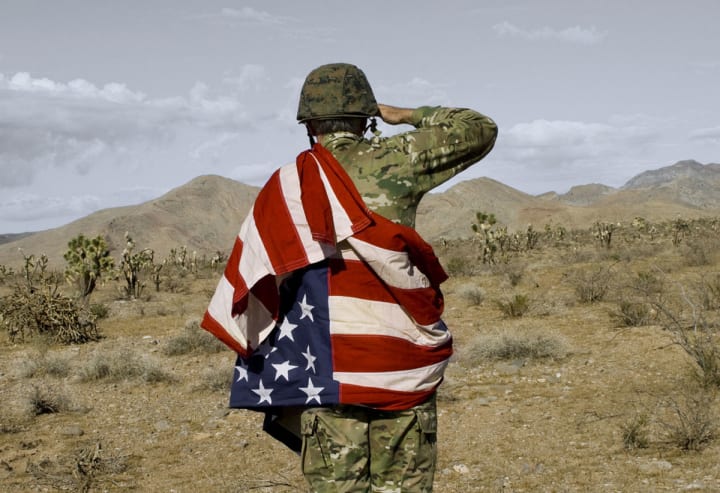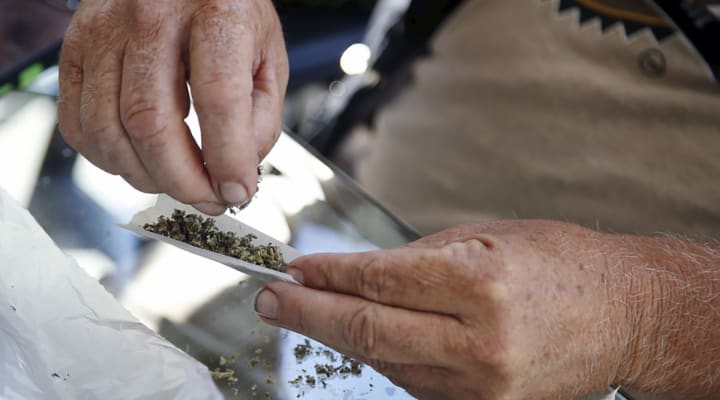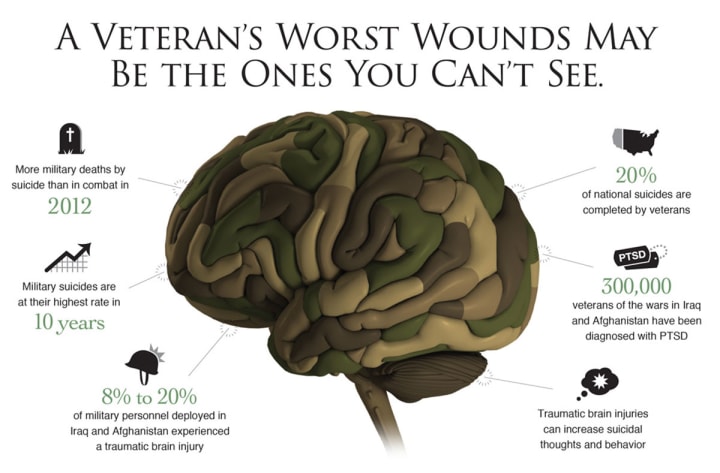Marijuana for Veterans with PTSD
The use of marijuana for veterans with PTSD is largely debated amongst the medical community.

Did you know that over 300,000 veterans from the Iraq and Afghanistan wars have been diagnosed with PTSD by the US Department of Veterans Affairs? And thousands of more have yet to receive recognition. Recently, a movement among US veterans advocating the physical and mental benefits of medical marijuana for PTSD has grown. They want the Department of Veterans Affairs to allow their doctors to recommend and prescribe medical marijuana as a treatment for the disorder in place of prescription drugs. The VA, along with other federal agencies and anti-legalization groups, still don't consider marijuana a solution for veterans suffering with PTSD. So why are veterans asking to use medical marijuana for PTSD? The drug is easing the pain for veterans inside and out.

Photo via Slate
That Others May Live
The sacrifices of serving in the military last long after our veterans return from war. For many veterans, the pain of post-traumatic stress disorder is too much to bare. Instead of drowning in addictive prescription drugs, they choice to naturally medicate with marijuana. Recently many veterans have come out claiming that marijuana greatly helps them deal with PTSD. Speaking to many news outlets, these veterans are using their experiences to try and get marijuana legalized for VA use. One specific Veteran named Ricardo Pereyda told Military.com that he suffered from severe post-traumatic-stress and that the drugs prescribed by the VA didn't help. Ricardo stated that he started using marijuana to treat his insomnia, depression, anxiety, and panic attacks, common symptoms of PTSD . With his use Ricardo said, “marijuana has helped him live a more full and productive life.” And he's not the only one.
Another veteran in favor of medical marijuana for PTSD is Marine veteran Mike Whiter of Philadelphia, PA. In an interview with the Associated Press, Whiter said, “I went from being an anxious mess to numbing myself with the pills they were giving me. Cannabis helped me get out of the hole I was in. I started to talk to people and get over my social anxiety.” Nonetheless, marijuana use is still illegal in Philadelphia.
Other veterans along with Ricardo and Mike are also shouting the praises of using medical marijuana, many willing to risk trouble with the law in order to relieve themselves of the symptoms of PTSD. Many fear using the medicines the VA prescribed, stating reasons of “walking unconsciousness” and “mindless zombie mindset” as their fears. Some of these side effects have also been mentioned by other organizations who are pro-marijuana.
Michael Krawitz, executive director of Veterans for Medical Cannibus Access, is also a big proponent for veterans to use medical marijuana. On VMCA's website, Krawitz is quoted saying,
“...My personal injuries led me to find medical cannabis to help control my chronic pain. My fellow Vets, thousands of them have found the same medicine to relieve their suffering and will appreciate this strong support…”
Vets for Cannabis is yet another organization urging for the approval of medical marijuana for veterans. Jack Stieglman, the agency founder, has said that he was driven to start Vets for Cannabis from his own experience with combat and returning home a “Disabled Veteran.” He talked of how he witnessed the dark side of PTSD inside his battle buddies and himself. When he first started using marijuana, he was amazed at how it helped him with his PTSD. In Stieglmen's blogs, he talk a lot about his work trying to change the way society viewed marijuana. He attempted many times to show that veterans wouldn't abuse marijuana rather use it responsibly.
Hell in a Helmet
The common mindset among all these veterans are that they agree the pharmaceuticals prescribed have more harmful side effects than actual benefits. Krawitz and Stieglman both have detailed about how painkiller overdose deaths has decreased in states that have legalized marijuana. But, not only veterans are for medical marijuana, there are some doctors who are pro-marijuana, too.
Longtime contributor to the pro-marijuana movement, Dr. Philip Leveque, also know as the “Pot Doc”, worked hard to change Oregon law to allow the medical use of marijuana in 1998. Dr. Leveque's stance on medical marijuana, up until his death in 2015, was that medical marijuana was very helpful in combating PTSD. While Dr. Leveque knew marijuana was not a PTSD cure, he felt it provided outstanding relief to his patients troubled with PTSD.
Veterans testimonies to the VA all claim that marijuana is effective against PTSD. Just as how military members do, these veterans are banding together to try to convince the VA, DEA, Congress, and anti-legalization groups that medical marijuana beneficial against PTSD. Many veterans struggling with PTSD are fed up with medicines that are either ineffective or make them experience harmful side effects.
However, despite the claims and accounts on how medical marijuana is helping them, the VA hasn't budged. As far as the VA is concern marijuana is illegal, therefore they prohibit doctors to prescribe or sign cards allowing veterans to obtain medical marijuana.

Photo via The Daily Beast
Not Self, but Country
One main reason the VA is against issuing medical marijuana and/or cards to veterans is because as a federal government entity, marijuana is still classified as a Schedule I drug.
If you're not familiar, Schedule 1 drugs are defined as drugs with no "currently accepted" medical use, and a high potential for abuse. The DEA goes on stating that Schedule I drugs are “the most dangerous drugs of all the drug schedules with potentially severe psychological or physical dependence.”
And since the DEA is the authority on legal and illegal drugs, the VA don't want to face legal penalties allowing their doctors to recommend medical marijuana to any veteran. In the VA and DEA's opinion, recommending cannabis to veterans is considered “aiding and abetting criminals.”
The VA also states that there is no solid research supporting veterans claims that medial marijuana relieves symptoms of PTSD. Without this research, the VA forbid its doctors from even mentioning medical marijuana to their patients.The federal government has one stand on marijuana: it's illegal, period. However, it's not only federal government agencies completely against medical marijuana use for veterans.
Anti-legalization groups, such as Smart Approaches to Marijuana, also feel that approving the use of medical marijuana will do more harm than good. Sally Schindel, board member of Arizonians for Responsible Drug Policy group, travels around the country telling about the experience she had with her son, Andy, committing suicide due to his marijuana use.
During an interview on the The Seth Leibsohn Show podcast, Schindel talked about how Andy's marijuana use slowly led him to suicide. She mentions that little by little Andy would separate himself from friends, distance himself from her, and appeared to have lost all desire to live. She told the host that after that experience she would hate to see any other parent or spouse suffer through the same thing she did with her son.
Schindel, along with her other members of the ARDP group, feel that constant use of marijuana won't relieve depression, anxiety, or other symptoms of PTSD. It will only make the symptoms worse. Schindel said in the interview that she believed that marijuana was what finally made Andy kill himself.

Infographic via Dog Tag Buddies
No Better Friend, No Worse Enemy
Another opponent to marijuana for PTSD is the medical community. Many doctors have spoken out against marijuana's secondary effects, which can be more severe than the symptoms that people originally use cannabis for. The good feelings that many users have using medical marijuana won't be there the morning after, resulting in that individual having to immediately get an early morning marijuana “fix” to alleviate the symptoms that person suffers with. Or worse, personality traits in people with PTSD, like anxiety and paranoia, may worsen with marijuana. Without being able to define how the marijuana will effect each individual specifically, it is not seen as an optimal treatment type.
Over the past few months, the DEA has given approval for researchers to test the effects of marijuana on veterans with PTSD. This announcement is great news to the pro-medical marijuana movement, but what happens if the research proves that marijuana is not beneficial? Would these veterans still use marijuana even thought it will still be against federal law? Would veterans and other proponents find other methods to change the minds of opponents? Will those that oppose medical marijuana ever come to accept the movement of veterans who are wanting medical marijuana to relieve their PTSD and other mental disorders? Time, and science, will only tell.
About the Creator
Izzy Erlich
Upstate New Yorker, who loves to travel to Colorado and Vancouver. Certified Yoga instructor.






Comments
There are no comments for this story
Be the first to respond and start the conversation.